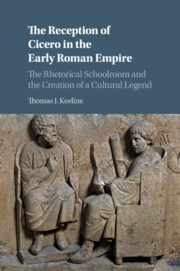Description
The Reception of Cicero in the Early Roman Empire
The Rhetorical Schoolroom and the Creation of a Cultural Legend
Author: Keeline Thomas J.
Explores the crucial role played by rhetorical education in turning Cicero into a literary and political symbol after his death.
Language: English
Subject for The Reception of Cicero in the Early Roman Empire:
Approximative price 39.35 €
In Print (Delivery period: 14 days).
Add to cart
The Reception of Cicero in the Early Roman Empire
Publication date: 01-2020
Support: Print on demand
Publication date: 01-2020
Support: Print on demand
Approximative price 128.95 €
In Print (Delivery period: 14 days).
Add to cart
The Reception of Cicero in the Early Roman Empire
Publication date: 07-2018
384 p. · 15.8x23.5 cm · Hardback
Publication date: 07-2018
384 p. · 15.8x23.5 cm · Hardback
Description
/li>Contents
/li>Biography
/li>
Cicero was one of the most important political, intellectual, and literary figures of the late Roman Republic, rising to the consulship as a 'new man' and leading a complex and contradictory life. After his murder in 43 BC, he was indeed remembered for his life and his works - but not for all of them. This book explores Cicero's reception in the early Roman Empire, showing what was remembered and why. It argues that early imperial politics and Cicero's schoolroom canonization had pervasive effects on his reception, with declamation and the schoolroom mediating and even creating his memory in subsequent generations. The way he was deployed in the schools was foundational to the version of Cicero found in literature and the educated imagination in the early Roman Empire, yielding a man stripped of the complex contradictions of his own lifetime and polarized into a literary and political symbol.
Introduction; 1. Pro Milone – reading Cicero in the schoolroom; 2. Eloquence (dis)embodied – the textualization of Cicero; 3. Remaking Cicero in the schoolroom – Cicero's death; 4. Pro Cicerone/In Ciceronem – how to criticize Cicero; 5. Seneca the Younger and Cicero; 6. Tacitus: Dialogus de Cicerone?; 7. Est … mihi cum Cicerone aemulatio – Pliny's Cicero; Epilogue – the early empire and beyond.
Thomas J. Keeline is Assistant Professor of Classics at Washington University, St Louis. His research and teaching interests extend to all aspects of the ancient world and its reception, with a particular focus on Latin literature and the history of education and scholarship. He has published articles and reviews in the fields of Latin literature, lexicography, metrics, the history of classical scholarship and the classical tradition, and textual criticism.
© 2024 LAVOISIER S.A.S.




